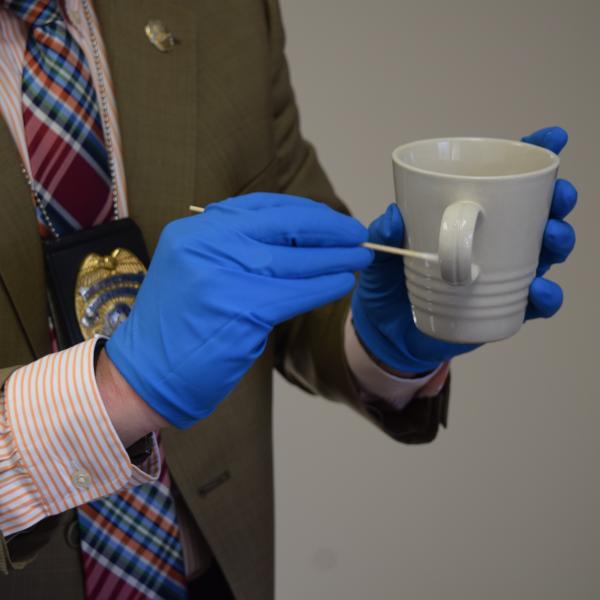Delaware Valley University’s graduate certificates in Criminal Justice are designed for professionals in law enforcement, corrections, private security, and public safety who want to advance their career. The certificate program allows baccalaureate-level professionals with the opportunity to stand out amongst their peers for senior-level leadership positions without the commitment to a graduate degree. Should you wish to continue, the certificate is completely transferable to DelVal’s master’s degree in criminal justice, and you will have already completed 40% of the degree.
Advanced Criminology
This course will provide you with an understanding of topical issues in contemporary criminology. The course is designed to provide opportunities for active learning and critical analysis with an eye towards an understanding of the social reality of crime and crime control as well as how the social administration of justice operates. Specific areas to be discussed include: the correlates of crime (race, class, gender, and age); violent crime; economic crime; policing; and the control and regulation of criminals in the courts and corrections. Further, you will learn to apply your knowledge to better understand contemporary criminal justice research, evaluation, and policy analysis.
Police and the Community
This course examines relationships between the police and the various communities they serve. Particular attention is given to the manner in which crime is addressed and quality of life issues. Community is examined as a geographical space made of multiple and diverse publics sometimes requiring different strategies and attention. A distinction is drawn between public relations and police community partnerships.
This course identifies and analyzes minority issues relating to our criminal justice system and the resultant polices and laws that have been established. A comprehensive, critical, and balanced examination of the issues of crime and justice with respect to race and ethnicity will be presented. Procedures and policy in a pluralistic and multicultural society are examined relative to law enforcement, courts, and corrections environments.
This course will introduce you to contemporary issues of American corrections and fundamental theories of punishment and treatment. Emphasis will be placed on polices, practices, issues, and controversies within the correctional system. The incarceration of various criminal populations in jail and prisons, alternatives to incarceration (e.g. probation and parole), and the public policy issues surrounding the expansion of community-based corrections will also be discussed.
The purpose of this course is to explore the presence of authority, power, force, and discretion in each of the sub-system of the criminal justice system. Administration actions and ethical issues permeate the criminal justice system. We will analyze the importance of ethical leadership, as well as the tension between deontological ethical systems and teleological or “means-end” ethical analysis. Discussions may include police corruption, CJ Certificates 11 prosecutorial misconduct, ethical issues in sentencing, prison corruption, and ethics in the creation and implementation of crime control policy.
Crisis Communications for Criminal Justice Officials
From natural disasters to active shooter/hostile incidents, crises are dynamic, unexpected events that involve significant threat and ongoing uncertainty. Yet amid limited and conflicting information, public safety leaders are tasked with making crucial decisions and communicating the progression of the event to the public all the while exercising empathy, competence, honesty, commitment, and accountability. Crises are often multidisciplinary, and multijurisdictional, drawing leaders and experts from a variety of backgrounds and governmental roles. As a result, when a crisis strikes, a management team is assembled with several ranking public safety officials front and center. Public safety leaders must be prepared to share information that is correct and credible using a variety of media platforms. In this course you will analyze several noteworthy incidents for their communications and management strengths and weaknesses. You will use “lessons learned” derived from after action government and academic reporting to develop a strategy to navigate a crisis while fostering resiliency and cooperation through leadership. You will also utilize concepts such as meta-leadership and CERC (crisis and emergency risk communication) principles in case study analyses. In addition, you will explore techniques that cultivate valuable trusted relationships with the media, community leaders, and other critical stakeholders before a crisis strikes.
This course provides you with an in-depth overview of the quantitative and qualitative research methods used to support contemporary criminal justice and public safety policy initiatives. In a world of data driven strategies and evidence-based practices, today’s criminal justice professionals must possess an advanced understanding of research, including how research projects are designed and funded, as well as how data is gathered, analyzed, interpreted, and applied to policy and practice. Upon completion of this course you will demonstrate proficiency in data analysis, interpretation, and application in the criminal justice field.
There are very few topics that can generate both tremendous public appeal and opposition as the discussion of various security threat groups. Politicians, agents of the criminal justice system, and the general public have strong and often polarizing views on the topic of gangs. This course will examine domestic and international drug cartels, religious extremists and gangs, both on the streets and in prisons. Attention will be given to the philosophical, sociological and structural influences that encourage the creation of various threat groups and the tactics agents use to monitor, intervene and control threat group activity.
